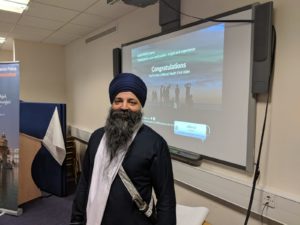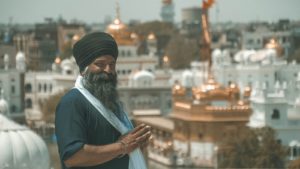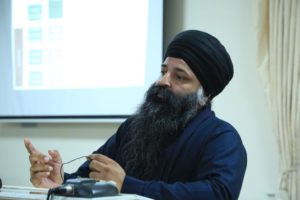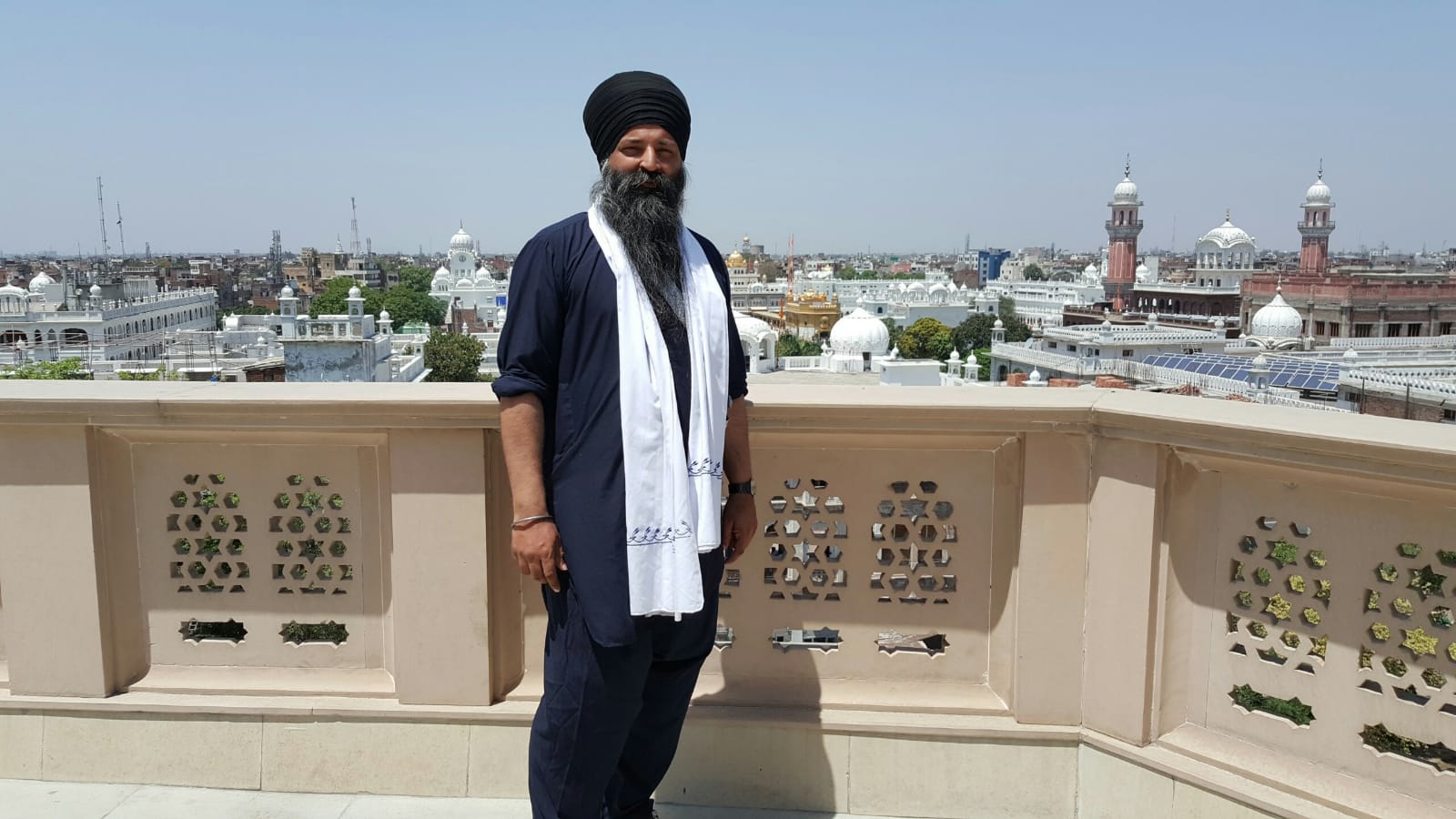June – Tarsem Singh
I’m Tarsem Singh an IT director based in the Midlands, passionate about creating and developing Sikh resources.
Q. Tell us about yourself and your profession?
A. I am an IT Director with a background in Computing Science and have been leading Software Development teams for over 20 years.
Q. Your Child/Children’s ages, who they are and what are they like?
A. I have two sons; one is still at school aged 15, the other has just finished his Degree in Law.
Q. You have worked on and developed a number of Sikhi desktop and mobile apps, regarding Sikh resources where do you see the future?
A. Sikh technical resources are essential for our future and the make learning more exciting, easy and accessible. There is still a lot to do to get the Sikh faith at the fingertips of the general public worldwide.
Q. You were pivotal in the creation of SikhitotheMax, how did it all come about? Could you have envisaged it being used worldwide today?
A. This was just part of my skills at the time. Whatever I had learned I tried to apply it to Sikhi and created a very useful database to do the searching. This moved further when experimenting with the first letters of words which turned out to be a bit of a revelation. The way Gurbani is written, using first letters and not worrying about the complex spelling of words allowed for “live searching” of Shabads while Keertani were performing. The addition of a screen changed the way the Sangat engaged in Rehnsbhai Keertans and regular Divaans. The application was all Beta and unfinished but it spread quite quickly. Technology usage at the time of no mobiles was rare in Gurdwara Sahibs. So Guru Jee’s blessing really.
Q. You recently attended a mental health first aid course, what did you learn? And why do you feel its important?
A. Mental Health is affecting more and more people worldwide and is reaching epidemic proportions. It is highly likely that someone close to us will have mental health issues at some point in their life. It is very important that we all have some understanding of it as interacting with someone who has mental health issues is a very delicate area. Even recognising it is important so I think as many people as possible need to be first aid trained. There are more suicides of Sikhs in the UK now than ever before, so we need to act fast to become helpers.

Q. June is an important month for Sikhs as we remember the attack on Darbar Sahib (Golden Temple) in 1984, after 34 years what would be your message to all Sikhs worldwide?
A. Recognition of Sikhi as an important part of this planet is still a huge challenge. India is where the faith started and had it not been for Sikhi; the land would now be an Islamic country. Events from 1978 to 1984 and beyond were just a rude awakening for us Sikhs. I hope that everyone regardless of their career puts something back into the Panth selflessly so that it can grow very strong. These down points are part of the course and journey for anything coming into fruition- it is a foregone conclusion that Sikhi will be a very positive part of this planet – it is just a matter of time.

Q. You have delivered talks and workshops all around the world on Sikhi, what are the common difficulties people are facing in the progression of their Sikhi?
A. The key thing is sticking to the path and making continued progress. When taking Amrit, we are all on a high. It is a new chapter of our lives, and we are energetic. But slowly that wears off and then reality kicks in. It is hugely important that we have very strong Sikh units all over the world that can support their local communities. The Khalsa is a distributed army that keeps training to improve. Finding Sangat that drives your forward, keeps you in Chardhi Kala and remains in Vigaas – spiritual happiness is very important.

Q. Who has been your biggest inspiration?
A. There is no bigger inspiration than Guru Sahib. That is what unites us all. But I have tried to study Bhai Gurdas Jee often – it is clear that Bhai Gurdas Jee and Baba Buddah Jee were the most inspirational Sikhs from our history if you want to learn about Sikhi at the root level. The writings of Bhai Gurdas Jee are totally essential to understanding Gurmat. They are second only to Gurbani. In the modern day, Bhai Sahib Bhai Randhir Singh has been by far the most inspirational as his grasp on Gurmat and clarity of Gursikhi requirements are really inspirational.

Q. What has been the best piece of advice you have received?
A. The best piece of advice is to be the same Gursikh when you are on your own that you portray to the outside world.
Q. What have you learnt from your own father?
A. To be quiet, hardworking and not complain even if others do not treat you right.
Q. What would be your advice for anyone who is about to become a Dad for the first time?
A. Before you become a Dad you should always do an Ardas to Guru Jee first. This should be that the soul Guru Jee sends is one of a Gurmukh who you will parent and look after but ultimately will be a sevak of the Khalsa.
Q. Whats the biggest lesson about life your child/children have taught you?
A. My children have taught me that if you give a child anything that they want, it is a form of child abuse as they will never learn and will never appreciate. If Guru Jee gives me everything that my mind ever desired, my Guru would be irresponsible. Satguru is never irresponsible.
Q. As Sikhs we’re all considered brothers and sisters, if your brother/sister was finding it difficult to encourage their children into Sikhi, what advice would you give them?
A. You can only do Ardas. Sometimes Karam are very strong and Sikhi does not always come to children in the way we expect it to. Always keep your children in good Sangat – this is done by keeping good Sangat yourself.
Q. If you could create anything to help support other dads, what would it be?
A. There is nothing that can be created equal to Gurbani. If you use it and shower your children with some of the blessings it gives you it is magical.
Q. Can you tell me a funny story of something that’s happened to you while being a father?
A. Yes – one piece of advice, do not pick your children up above your head. Mine threw up in my beard once. Not very nice.
Q. As a father what has been your most rewarding experience so far?
A. Most rewarding is that you have children, some couples can never have them so you should appreciate them for whatever they are.
Q. What’s been your biggest challenge in fatherhood so far?
A. Fatherhood will remain a challenge to the end. The hardest thing is the inspire your children to be the best that they can be and not be a burden on this earth.
Q. Lastly, if you had to sum up being a Dad in one sentence, what would it be?
A. You have to eat mirch (chilly) sometimes but ultimately it is laddoo (sweet) eating and a beautiful thing that Vaheguru Jee has made.
Summary
Tarsem Singh is someone that I have known for many years now, he is a well-respected figure among Sikhs in the UK. The SikhitotheMax translation software that was first presented to us on in our Gurdwaras some 15 years ago now, was pivotal in my journey onto the path of Sikhi. I will never be able to thank him enough for his role in that, knowing him now and how humble he is, he will always look to the next project, with that in mind SikhitotheMax mobile is finally on the horizon and will be launched very soon by Share Charity UK. Most recently he has created infographics on such topics as the Sikh wedding ceremony and the Life of a Gursikh, keep an eye out for these as they will be appearing in Gurdwaras throughout the UK in the coming months. Over the years he has done many lectures and workshops which I have always found very useful, I love how he has always brought slides to life and offered advice on marriage and parenting as a part of growing spiritually. I am truly honoured that he agreed to give this interview for Sikh Dad and share his thoughts on parenting. If you would like to keep in touch with Tarsem Singh and get connected with his latest downloadable content you will find more information on http://www.sharecharityuk.com



